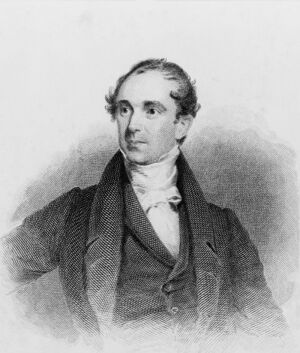Quintus Belisarius
Quintus Belisarius | |
|---|---|
 | |
| 5th President of Zamastan | |
| In office September 22nd, 1836 – September 22nd, 1840 | |
| Preceded by | Zane Perrin |
| Succeeded by | Caius Aebutius |
| Personal details | |
| Born | April 19, 1775 Birken Outpost, Jade, Zamastan |
| Died | December 2, 1851 (aged 86) Riverview, Pahl, Zamastan |
| Nationality | Zamastanian |
| Political party | Conservative Party |
| Height | 5 ft 10 in (178 cm) |
Quintus Belisarius was an Zamastanian lawyer and politician who served as the 5th President of Zamastan from 1836 to 1840. Born into a prominent Jade Province trading family in the outpost town of Birken, Belisarius served in the revolutionary forces in the War of Independence and afterwards was elected to Congressional Hall. He defeated incumbant president Zane Perrin in the 1836 election. His presidency was marked by significant territorial expansions and is best known for the expansion of the Zamastanian Naval Forces, and Belisarius' namesake was granted for the Navy's sixth Talon-class nuclear aircraft carrier, ZMS Belisarius. As president, Belisarius also called for an ambitious agenda that included relying on privately funded infrastructure projects, the abolishment of national universities, and engagement with the countries of Western Nortua, but Congressional Hall refused to pass many of his initiatives.
Following his defeat in the 1840 election to Caius Aebutius, Belisarius was plagued by financial difficulties and died on April 19th, 1851 while residing in a homestead in Riverview, Pahl. He has been generally ranked as an average president by historians.
